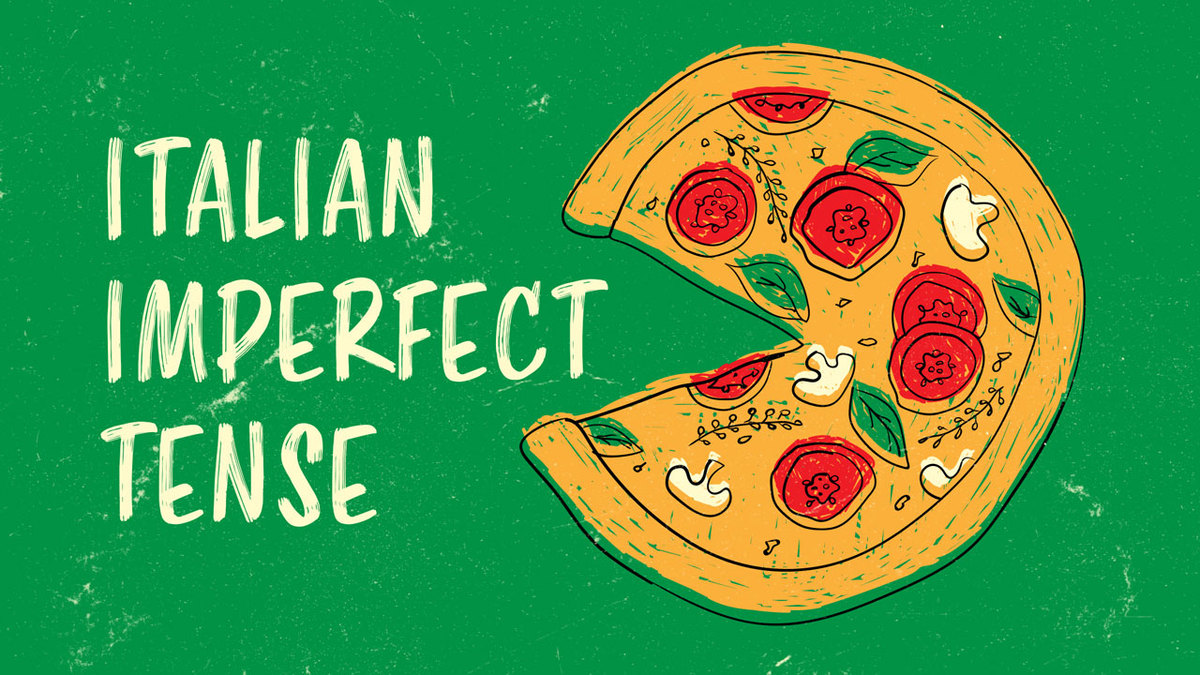
The imperfect tense in Italian learn it with a game! Easy Italian 34
Italian vs.English In English, the imperfect tense in usually translate with: Use of the Imperfect Tense: Italian vs. English How to Conjugate the Imperfect Tense in Italian I have some great news for you. The imperfect is the most regular Italian verb. It just adds the imperfect endings - vo, -vi, -va, -vamo, -vate, -vano to the stem of the verb.

The Lovely Imperfect A Surprisingly Friendly Italian Tense FluentU
Tutorial covering irregular verbs in the imperfect tense. List of present tense irregularr verbs, with conjugations.. Italian Verbs . Irregular Verbs in the Imperfect Tense. The imperfect tense has a few commonly used verbs that are irregular. Bere ("to drink") Dare ("to give") Dire ("to say") Essere ("to be") Fare ("to do/make")

Imperfect Tense / Il Tempo Imperfetto Learn Italian with Polly Lingual
The imperfetto indicativo is an essential Italian past tense, used principally as a background or anchor to another simultaneous action in the past, or to express an action that repeated itself routinely over a certain time frame in the past.

Imperfect Italian Tense Easy Language Hacks to Use It Like a Pro!
The imperfect tense ( imperfetto) refers to both distant and recent past occurrences that happened on a regular basis. In this lesson, we will show you how to use the imperfetto tense and will give you some tips to help you avoid some common pitfalls. Its rules are pretty straightforward and once you learn them, it will begin to come naturally.

Learning to speak Italian Learn how to conjugate Italian Verbs in the
the imperfect past tense of "to be"), but that one explanation will cover most situations for you. When to Use the Imperfect Past Tense in Italian. Related Learning: 15 Online Language Lessons to Learn Italian for Free. The perfect past tense is the "default" tense to use when in doubt. You should only use the imperfect past tense when:

Italian imperfect tense imperfetto (part 1) Italian with Prof Corsini
In grammatical terms, "perfect" means "complete," so the Italian imperfect tense is used to describe an incomplete or ongoing action or state of being. The imperfetto is usually equivalent to "was" or "was ___-ing" in English ( past progressive) and is used for all of the following: 1) Descriptions (age, feelings, health, time, weather.)

Italian Imperfect Tense Learning Resource + Exercise — Weilà!
You form the imperfect tense of regular -are, -ere and -ire verbs by knocking off the -re from the infinitive to form the stem of the verbs and adding -vo, -vi, -va, -vamo, -vate, -vano. The following tables show the imperfect tense of three regular verbs: parlare (meaning to speak), credere (meaning to believe) and finire (meaning to finish).

IMPERFETTO vs. passato prossimo Italian language learning, Learning
What is that exactly. We've learned one way to use the past tense in Italian, and that's passato prossimo. But another important tense is the imperfect tense. What is that exactly.

Italian Imperfect Tense Language Hacks » Fluent in 3 Months
The imperfetto is one of the most commonly used past tenses in Italian, together with passato prossimo. It is often used to express a continued and prolonged action or a habit that happened in the past. Luckily, most Italian verbs present a regular conjugation for the imperfetto tense, but there are still some exceptions.

A Simple Guide to the Imperfect Tense in Italian Smart Italian Learning
The imperfetto is one of the two main past tenses in Italian, the other being the perfect past tense or passato prossimo. Passato prossimo is the most basic past tense, used to talk about things that happened, from start to finish, in the past. Most people choose to learn the passato prossimo first and the imperfetto second.
/GettyImages-73246119-596b92cf3df78c57f4a8f224.jpg)
How to Use the Italian Imperfect Subjunctive Tense
You form the imperfect tense of regular -are, -ere and -ire verbs by knocking off the -re from the infinitive to form the stem of the verbs and adding -vo, -vi, -va, -vamo, -vate, -vano. The following tables show the imperfect tense of three regular verbs: parlare (meaning to speak), credere (meaning to believe) and finire (meaning to finish).

ITALIAN IMPERFECT TENSE CONJUGATION PRACTICE Teaching Resources
Imperfect is an Italian verb tense that is used for many different functions. Let's see them together. 1. Imperfect tense is used to indicate a fact happened in the past. 2. Imperfect tense is also used to talk about a past action that was carried out as a habit. 3.

When to Use the Imperfect Tense and When to Use the Past Tense in
The imperfect tense in Italian tends to take over on behalf of the past continuous/progressive. WHEN TO USE THE IMPERFECT TENSE IN ITALIAN - You can use the "imperfetto" in Italian to talk about habits you had time ago: Da piccolo, mi piaceva andare dal gelataio (When I was a kid, I liked to go to the ice cream parlor)
/pexels-photo-96450-574de0f85f9b5851658527a0.jpeg)
Imperfetto Italian Imperfect Tense
Imperfetto (imperfect) and passato prossimo (perfect tense) are the most common tenses to talk about past events in Italian. But when to use one and when the other? You normally use passato prossimo to talk about specific events and imperfetto to give contextual information. There are more nuances to it, of course, so without further ado, let's get started!

ITALIAN ARE VERBS IMPERFECT TENSE Teaching Resources
First of all, the imperfect tense is a tense used in Italian to talk about an action in the past. The Italian verb conjugation of this tense needs to be learned by heart but fortunately, in many cases, Italian verbs are regular when conjugated to the imperfect .

Imperfect tense in Italian Commonly Used Words
What Is the Italian Imperfect Tense? We use the Italian imperfect to set the scene for a story, describe a situation, talk about oft-repeated past actions, designate time between past actions and much more. It corresponds roughly with English phrases like "we were traveling" or "we used to travel."